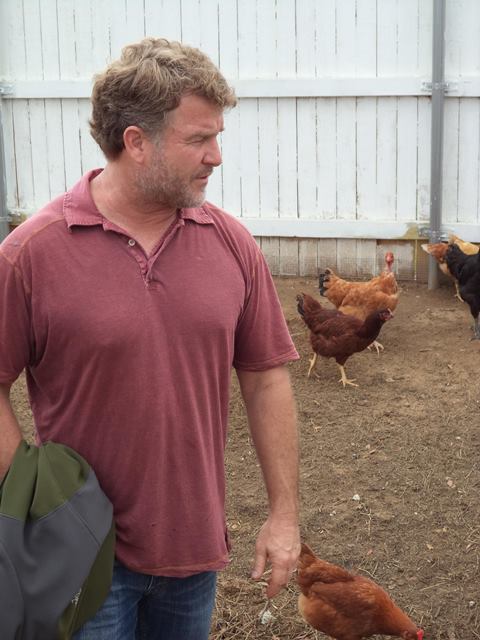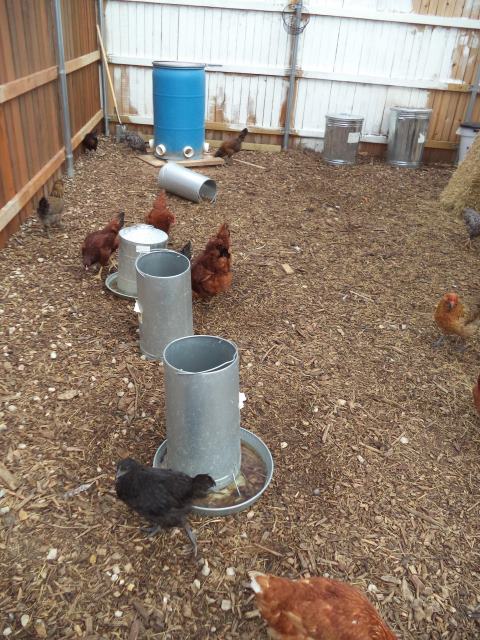By Ken Camp
Some labels seem contradictory — urban farmer, for instance.
Ask Daron Babcock what he knew about agriculture, poultry-raising and animal husbandry before he launched Bonton Farm-Works in South Dallas.
“Zero. I’m surprised these girls are still alive,” he said, looking down at hens pecking the ground near his feet. “I learned how to take care of them watching videos online. YouTube and Google are my friends.”
In spite of Babcock’s professed inexperience, chickens and goats thrive at Bonton. Vegetables flourish, and fruit trees bear the promise of a future harvest at an oasis in the middle of an urban food desert. Former inmates and other people whose lives have been shattered by poverty, addiction and bad choices find meaningful work on the farm.
Not bad for a former executive with a private equities firm — particularly one who passed through a dark period of grief after his young wife’s death due to cancer. That time led to his season of dependence on alcohol and cocaine.
“For the first time, I was powerless,” Babcock said. He grew up in a Christian home, attending First Baptist Church in Amarillo, Texas. “My life was in a tailspin. I was in a broken place. That’s when I surrendered to the lordship of Jesus Christ. … He restored my life.”

In the process, God radically reordered his priorities.
“The more success I had in my career, the less [my life] looked like what I saw in Scripture,” he said.
He began attending a weekly Bible study in the Bonton community in South Dallas — a blighted neighborhood filled with poverty and crime.
As he grew to know the people there, he quit his job and became an urban missionary to Bonton working with HIS BridgeBuilders, a Christian community-development ministry. Multiple suburban churches support BridgeBuilders, and the program works with inner-city partners such as Cornerstone Baptist Church in South Dallas. BridgeBuilders offers a continuum of redemptive services, including vocational education, life-skills training, mentors, economic development initiatives and youth programs.
“We believe we need to be a relational presence in the communities we serve,” said Michael Craven, president of BridgeBuilders. “As we become a neighbor and exercise love for our fellow neighbors, we find ourselves invited into solving problems in the community.”
So, Babcock sold his home in suburban Frisco and relocated to a house on the corner of Valentine and Bexar streets, in the heart of Bonton. He soon learned he had moved into what some sources identified as the most-unhealthy ZIP code in Texas — an area plagued by diabetes and heart disease.
When he talked to neighbors about making healthier decisions regarding diet, he learned they had no choices, other than from which liquor store or convenience store to buy junk food. Anyone wanting to shop at a full-service grocery store using public transportation had to endure a three-hour round-trip by bus.
So, Babcock bought the empty lot next to his house and planted a garden. He offered its produce to anyone willing to help tend it.
“The pilot garden became a beacon of hope — evidence something can change in the community,” Craven said. “It attracted people. Drug dealers and police officers stopped by to check on it — sometimes at the same time.”
The small garden led to the more ambitious launch of Bonton Farm-Works on acreage near the Trinity River levee. The farm operates as part of the Good-Works Company, BridgeBuilders’ for-profit subsidiary.

“The immediate goal is to provide food and jobs,” Craven explained. But the program has a loftier mission — lives changed by Christ.
“The most powerful context for life-on-life discipleship is a productive environment. It’s a context for life transformation,” he said.
Babcock learned that lesson after moving to Bonton.
“It’s all about relationships,” he said. “When I came here, I thought I had all kinds of business strategies to give to the community. But the doorbell kept ringing. Eventually, God got my attention, and he told me, ‘Love my people.’
“When you actively build relationships, you build trust. You get invited into people’s lives — into the restoring of broken relationships.”
